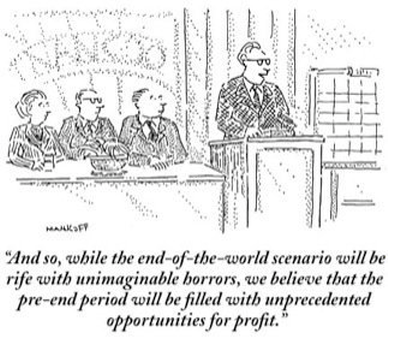 We can also posit a general rule that those who inherit wealth and succumb to FOMO are eventually less wealthy while those who are wealthy and take a pass on FOMO / hoarding at the top of the manic frenzy increase their wealth.Judging by the panic buying of everything from homes to yachts to lumber futures, it seems the world has run out of everything except newly issued central bank trillions, and so the logical response is FOMO (fear of missing out) and hoarding: buy everything you can get your hands on today lest it become unavailable or more expensive tomorrow.
We can also posit a general rule that those who inherit wealth and succumb to FOMO are eventually less wealthy while those who are wealthy and take a pass on FOMO / hoarding at the top of the manic frenzy increase their wealth.Judging by the panic buying of everything from homes to yachts to lumber futures, it seems the world has run out of everything except newly issued central bank trillions, and so the logical response is FOMO (fear of missing out) and hoarding: buy everything you can get your hands on today lest it become unavailable or more expensive tomorrow.
FOMO is wonderful for sellers and profiteers who can jack up prices and enjoy bidding wars during the panic buying.
FOMO and hoarding are instinctual behaviors to shortages, perceived and real. There’s nothing quite like the surge onto the last bus or train of the day when transport is scarce. Cash becomes trash when you need whatever is scarce and you’re afraid you won’t be able to get it at any price.
All this is rational when the threat of what happens if you miss out is existential. As in, not getting in a boat means you drown, not getting some water means you die of thirst, etc.
But is not being able to buy a new pleasure craft or home in a desirable area really the same? It feels the same way to the individuals caught up in the frenzy of FOMO, but FOMO and hoarding feel the same whether the scarcity is real or perceived, and the emotions triggered by scarcity are urgently intense: if I lose this bidding war, my life is over, etc.
On a lesser but still painful level, we don’t like losing or being left behind as the circus leaves town. If you’ve ever been bumped from an airline flight or been unable to get on that last train, watching all the shiny happy people board the aircraft while you’re left in the fetid terminal with the janitorial crew is not a warm and fuzzy feeling.
There’s another intense emotion that comes into play a bit later: buyer’s remorse. The bidding war arouses an excitement quite unlike other forms of engagement, and the euphoria of winning feels like the jackpot is yours, ripped from the greedy grasp of the undeserving at the last moment.
Then the euphoria fades and the sick realization that you’re on the hook for hundreds of thousands of dollars sinks in. At this point regret that one forgot the rational, calculating part of the mind and dashed head-long into the “last seat on the lifeboat / last roll of toilet paper” FOMO / hoarding.
One of my rules is to consider what benefits those at the top of the wealth-power pyramid. If we consider the case for hyper-inflation, for example, it’s difficult to make a case for hyper-inflation benefiting those who own the majority of the nation’s financial assets, i.e. the top 0.5%. Yes, the super-wealthy can move all their wealth into gold and bitcoin, but this requires sacrificing the income from all the assets that were sold to escape hyper-inflation.
| Wouldn’t it be cheaper and easier to just call a friend or three and make it known that hyper-inflation doesn’t work for you? Needless to say, it also doesn’t work for the bottom 99.5% whose earnings spiral down the drain in hyper-inflation.We can also posit a general rule that those who inherit wealth and succumb to FOMO are eventually less wealthy while those who are wealthy and take a pass on FOMO / hoarding at the top of the manic frenzy increase their wealth, as they anticipate a symmetric deflation in most of the FOMO / hoarding price spikes.
In other words, it’s worth pondering the possibility that cash won’t always be trash, and that overbidding by $400,000 to get “the last house in Cape Cod” overlooked the possibility that it wasn’t actually the last house and that suitable alternatives might be remarkably less expensive in a year. |
Dot-Com Bubble and Pop, 1994-2004 |
Tags: Featured,newsletter




























